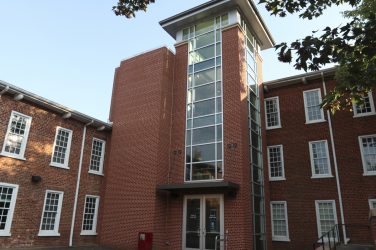Melissa Link, the commissioner for the West Hancock neighborhood and surrounding neighborhoods, said she struggled to have a majority of the commissioners and the mayor agree that the West Hancock Neighborhood is worth saving.
“I did a lot of kicking and screaming and forced this [study] to happen by assuring that there was a line item in the budget for a study,” Link said. “And that forced this study.”
Part of the study consisted of two meetings, with the second of the two occurring on Oct. 30, 2018. Two members from the Carl Vinson Institute of Government hosted a meeting in the Seney-Stovall Chapel for West Hancock Neighborhood residents to discuss perspectives of the area.
Why It’s Newsworthy: The future of West Hancock Neighborhood has been a concern for the residents, especially with the possibility of rezoning changes in the process by the Athens-Clarke Country Planning Commission.
The two-square blocks of The Varsity on Milledge Avenue and Broad Street is the main area of zoning concern in the neighborhood. On Nov. 1, 2018, the Athens-Clarke County Planning Commission included an item to discuss the rezoning for this specific area. The rezoning would change it from “Main Street Business” and “Traditional Neighborhood” to “General Business.” The recommendation was tabled, or postponed, at the Nov. 1 meeting.
This map illustrates the area in the Hancock Neighborhood that could be re-zoned. (Map by Kelsey Russo)
If the area was to be rezoned as “General Business,” it could cause a domino effect of changes. According to Link, changes in the zoning could mean an increase in higher buildings, population density and traffic.
This was the second of a series of two meetings about the West Hancock area. Ted Baggett, the associate director for the Carl Vinson Institute of Government, was present to help lead the discussion. Malik Watkins, a public service faculty member for the Carl Vinson Institute of Government, moderated. Watkins asked a series of questions to probe discussion out of the attending residents.
The original purpose of the meetings, Baggett said, was to gain neighborhood feedback on the aspects people liked and didn’t like about the area, the changes they see happening and their concerns about possible future changes.
The information from the residents will be compiled into a report and presented to the Athens-Clarke County Commission, Baggett said.
While Link was part of the process in making the study occur, she said she did not know when this particular meeting was happening. She found out from a resident of the neighborhood, Miki Lu, who was also in attendance at the meeting.
The turnout for the meeting was light, with seven neighborhood residents there, but those in attendance expressed their concerns about the neighborhood. Link related the small number of residents to the diversity of the neighborhood, which can create difficulties in reaching residents to collect feedback.
The meeting was led in discussion style, and there were three main areas of concern:
- Development in the neighborhood
- Zoning of the neighborhood
- Potential traffic influx
Kerry Steinberg, a Spanish professor at the University of Georgia, was one of the attendees. She has lived in the West Hancock Neighborhood for 10 years with her family.
Steinberg said her biggest concern for the neighborhood is the development. She is in the process of building a new home in the neighborhood, so she is not completely against development; however, she wants the nature of the neighborhood to stay intact. She does not want to see long-term residents pushed out, the prices of houses increase exponentially or the neighborhood change over to transient student housing.
“The fact that it’s more for families is, I think, valuable,” Steinberg said.
Link is also worried about losing the historical component of the neighborhood. As development occurs through the West Hancock Neighborhood, homes that have a historical tie to Athens are being demolished for new development.
“We are letting the memories of those people disappear when we tear down these buildings,” Link said.
But all of Link’s concerns about the West Hancock neighborhood come back to the issues surrounding the zoning of the area.
She said, “My primary concern with the issues in the neighborhood is we have zoning laid down on these neighborhoods that is allowing for the kind of threats that are happening right before our eyes.”
The issues expressed at this meeting were similar to the ones other residents raised at the first session, Baggett said.
Steinberg said these types of meetings are a way for the people in the neighborhood to have their voices heard. She hopes the input offered from both this meeting and the first meeting will be taken into account for the future.
“[These meetings are important] for developers to listen to the neighborhood and people who have lived here for a long time,” Steinberg said. “[It’s important] to listen to those concerns and not just collect them and ship them aside, but to really be listening and to consider what the neighborhood wants.”
Kelsey Russo is a senior majoring in journalism in the Grady College of Journalism and Mass Communication at the University of Georgia.







